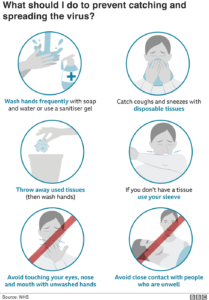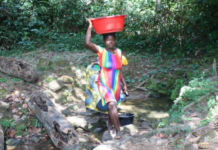So, what is the disease and how does it spread?
How do I protect myself?
The best thing is regular and thorough hand washing, preferably with soap and water.
Coronavirus spreads when an infected person coughs small droplets – packed with the virus – into the air. These can be breathed in, or cause an infection if you touch a surface they have landed on then your eyes, nose or mouth.
So, coughing and sneezing into tissues, not touching your face with unwashed hands, and avoiding close contact with infected people are important for limiting the spread.
Face masks do not provide effective protection, according to medical experts.
How deadly is coronavirus?
The proportion dying from the disease appears low (between 1% and 2%) – but the figures are unreliable.
Thousands are being treated but may go on to die – so the death rate could be higher. But it may also be lower if lots of mild cases are unreported.
A World Health Organization examination of data from 56,000 patients suggests:
- 6% become critically ill – lung failure, septic shock, organ failure and risk of death
- 14% develop severe symptoms – difficulty breathing and shortness of breath
- 80% develop mild symptoms – fever and cough and some may have pneumonia
-
Older people, and those with pre-existing medical conditions (such as asthma, diabetes, heart disease, high blood pressure), are more likely to become severely ill. The data from China also suggests that men are at slightly higher risk of dying from the virus than women.
Treatment relies on keeping the patient’s body going, including breathing support, until their immune system can fight off the virus. Work to develop a vaccine is under way.
- How close are we to a coronavirus vaccine?
- A visual guide to the outbreak
- Coronavirus: Your questions answered
What should I do if I think I have coronavirus?
The NHS says an epidemic in the UK is “likely”.
Patients with mild symptoms – such as a new continuous cough or a high temperature above 37.8C should self-isolate at home for at least seven days, according to the latest advice issued by Public Health England.
People are being advised not to ring NHS 111 to report their symptoms unless they are worried. They should also not go to their GP, or A&E.

Different prevention tips -
Details for Scotland are to check NHS inform, then ring your GP in office hours, or 111 out-of-hours. In Wales call NHS 111, and in Northern Ireland, call your GP.
If you have come into contact with somebody who may be infected, you may be told to self-isolate. Advice for people who have travelled back to the UK from affected areas and who may need to self-isolate, has been issued.
Other countries have introduced their own measures For example, the US Centers for Disease Control and Prevention advises people showing symptoms to call their healthcare provider, and those who are mildly ill to self-isolate.
The World Health Organization has also issued advice for the public.

























